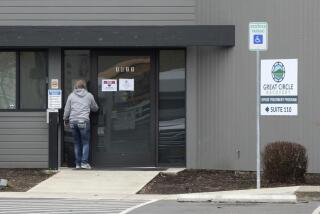Portland Makes Pitch for Expos
- Share via
PORTLAND, Ore. — Former Indiana Pacer General Manager David Kahn has turned his focus to a new sport.
Kahn is leading the effort to bring major league baseball to Oregon and he believes Portland would be the perfect place for a big-league team -- the Montreal Expos, to be exact.
“This is an opportunity that will only present itself maybe once this decade,” said Kahn, whose wife owns an advertising firm here. “We can’t let this pass us by. We can’t wait another year or two.”
Baseball’s committee deciding the future of Montreal’s troubled franchise has invited Oregon officials to New York on Tuesday for an informal meeting to start the bidding process for the team.
The Expos were purchased last year by the 29 other teams from Jeffrey Loria, who went on to buy the Florida Marlins. Now baseball is trying to figure out what to do about the 35-year-old franchise, which has drawn poorly at Olympic Stadium and has made it to the playoffs just once, in 1981.
The solution, at least for next season, is to showcase the Expos in San Juan, Puerto Rico, where the team will play 22 “home” games. But it’s anybody’s guess where the Expos will land in 2004.
Officials from Portland, Washington, D.C., and Northern Virginia have been invited to meet with the committee. Portland Mayor Vera Katz is leading her city’s delegation, along with Kahn, who is spearheading the Oregon Stadium Campaign.
A charming city in the shadow of Mount Hood that keeps getting chosen by magazines as one of the nation’s most livable cities, Portland lacks little -- except for a major league baseball team, although the city does have the NBA’s Trail Blazers.
“We know we’ve got great advantages on competitor cities,” said Drew Mahalic of the Oregon Sports Authority. “That is our strength, and we’ll be trying to expose all the assets that we have in the most favorable light.”
Before meeting with potential investors in each area, baseball wants to talk to government groups. Several baseball owners said at their recent meeting in Scottsdale, Ariz., that they would like financing in place for a ballpark before approving a move.
Portland has a temporary ballpark for the Expos: PGE Park, the 19,500-seat home of the Triple-A Portland Beavers.
Ultimately, Oregon would have to finance and build a major league sized ballpark at an estimated cost of $350 million -- more if it features a retractable roof to guard against Portland’s unpredictable weather.
But Oregon’s economy is a drawback to public funding of such a project. The state led the nation in unemployment for most of last year, and was hit hard by the Western energy crisis in 2001 and the subsequent collapse of energy giant Enron.
Oregon also is facing up to $310 million in budget cuts unless Measure 28, a contentious temporary tax increase, is passed by voters Jan. 28.
The budget crunch was demonstrated at the local level last month when Portland schools cut spring sports -- including baseball, softball and track and field -- to save money. A very public campaign to save the programs through private donations got a boost when Trail Blazers guard Damon Stoudamire, a Portland native, pledged $200,000.
Oregon’s economic travails make some people skeptical about bringing in a major league baseball team.
“Who wouldn’t want a big-league team in their town?” asked self-professed baseball fan Rick Glasser as he waited for a cup of coffee on a recent rainy morning. “I just don’t want to pay for it.”
Still, there are signs of growing enthusiasm. Bumper stickers have started appearing on cars around Portland with an altered MLB logo: rather than a bat, the player in the image is wielding an umbrella.
The Oregon Stadium Campaign, a coalition of the Oregon Sports Authority and the Portland Baseball Group, is preparing legislation that would raise funds through bonds to be paid off by players’ income taxes.
“What we’re attempting to do is be extremely sensitive to what is going on in the Oregon economy and the Oregon schools. The funding would come from newly generated streams of revenue connected to the advent of a major league baseball team in this state,” Mahalic said. “We’re not looking at money from the common taxpayer, or any area that would deplete the general fund.”
Two years ago, a similar stadium bill won support in both houses of the Oregon Legislature, only to be killed in the session’s final days when state Sens. Gene Derfler and Lenn Hannon blocked a vote on it.
Hannon says it’s not that he doesn’t like baseball. He just doesn’t buy supporters’ claims that average Oregonians won’t have to pay for it.
“I think it would be great if baseball came to Oregon,” Hannon said. “They’re just not going to do it on the taxpayer’s nickel.”
Owners of the San Francisco Giants proved a few years ago that it was possible to build a stadium with private money, but that might not be realistic in Portland’s case -- mostly because Portland doesn’t have an ownership group lined up.
The idea of bidding for a team without a potential owner is not a concern, supporters insist. Baseball officials have indicated they are more interested in a region’s ability to support a team, including a stadium project, in the preliminary stages.
“My understanding is that once a city is able to present a stadium package, I think there will be dozens of owners ready to step up,” Mahalic said.
The Oregon Stadium Campaign has already been working with HOK Sports, which created Baltimore’s Camden Yards, to explore suitable sites for a new ballpark.
With the Pacers since 1995, Kahn helped build the team’s $183 million home, the Conseco Fieldhouse, without a general tax increase to residents. He stepped down as GM last fall to spend more time with his family in Portland but still serves as an adviser to Pacers’ president Donnie Walsh.
A former sports writer for The Oregonian, Kahn is not an outsider. He is working closely with Mayor Katz to gather support at City Hall. A hurdle will be Portland’s financial contribution to the effort.
Kahn admits it’s a hard sell. But Portland, with about 1.7 million residents in the greater metropolitan area, is ripe for a new pro sports experience, he insists.
“We’re actually an underserved market,” Kahn said. “And I think baseball knows that and it will work in our favor.”


